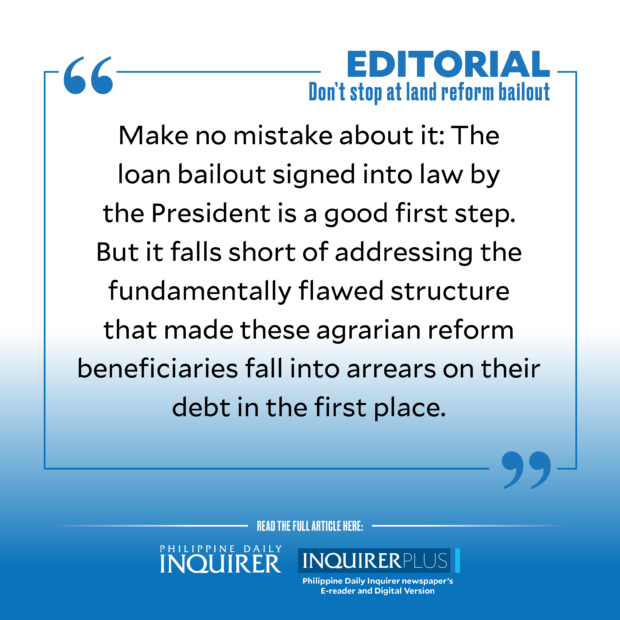Don’t stop at land reform bailout
 On one hand, the law enacted by President Marcos last week condoning some P58 billion of soured debts owed by the country’s agrarian reform beneficiaries is good news.
On one hand, the law enacted by President Marcos last week condoning some P58 billion of soured debts owed by the country’s agrarian reform beneficiaries is good news.
With the stroke of a pen, the Chief Executive and Congress gave over 600,000 farmers a fresh start after falling into arrears for the land that the government obtained for them from private owners.
On the other hand, this very same law could potentially be a dead end for both the beneficiaries and government if all stakeholders fail to take advantage of the clean financial slate offered by the measure and the farmers end up back in dire straits a few years down the road.
Under the agrarian reform system that has been in place since the early 1970s, farmers who have been tilling their plots of land for a certain number of years are entitled to have these properties acquired on their behalf by the government from private landowners.
The rationale for this is social justice, meant to break generational cycles that see children and grandchildren of farmers being figuratively chained to the land they work on to pay for the debts incurred by their forebears.
Without a support structure, there’s a very real danger that the same challenging economic realities that forced agrarian reform beneficiaries to default on their obligations will once more cause them to fall into debt and perpetuate this vicious cycle despite the fresh start offered by what is essentially a loan bailout.
To break this cycle here and now, it is important that policymakers implement a package of measures that will prevent farmers from falling into the same traps that already ensnared them before.
Such a package must include a comprehensive program to train these farmers in the latest agricultural science that will improve the yield of their farms, hopefully replacing once and for all the traditional farming methods that are no longer sufficient for the current demands of the market.
Agrarian reform beneficiaries (along with all other nonbeneficiary farmers, in fact) must also be given regular education and guidance on the proper way to handle their finances. This includes training on how to properly use debt to grow their businesses (and how not to abuse it, obviously), as well as how to improve their farm output with the help of various government and private sector programs available for them.
For its part, the government must help connect farmers to their markets more efficiently by improving logistics. This will help move agricultural products from farms to end users faster and more cheaply, resulting in higher incomes for farmers and lower prices for consumers.This is even more critical today as Filipino farmers, having been left behind in the use of science and technology, now have to compete with better trained, better funded, better equipped, and better supported rivals from overseas.
Make no mistake about it: The loan bailout signed into law by the President is a good first step. But it falls short of addressing the fundamentally flawed structure that made these agrarian reform beneficiaries fall into arrears on their debt in the first place.
What will prevent farmer-beneficiaries from trying, for example, to raise additional farming capital by pledging their farms as collateral (which the lender can foreclose once the 10-year ban on transferring these properties lapse)? And without fixing the broken system, what will give these farmers a better chance of avoiding the same debt pitfalls that made the bailout necessary in the first place?
On a side note, there is also a question of fairness. The law condones the debt of current beneficiaries on their land, but what about the future agrarian reform beneficiaries who have yet to be awarded their farmlands as of the measure’s cutoff date? Will they be given these lands for free? Or did the law just create a two-tiered agrarian reform program, with one set of farmers receiving their land for free while the other set will have to pay for it?
Going forward, it is imperative that the administration does not stop with Mr. Marcos’ act of signing the emancipation measure into law. It must learn from the expensive lessons of the past and put in place support mechanisms that will help farmers avoid falling back into debt defaults and costing the government more precious resources in the future.
Without fundamental reforms to the system—if the same structure that caused the farmers to default on their obligations remain in place—it is not farfetched to expect that our agrarian reform beneficiaries will need a second bailout in a few years, alongside those who are yet to become beneficiaries themselves.




















